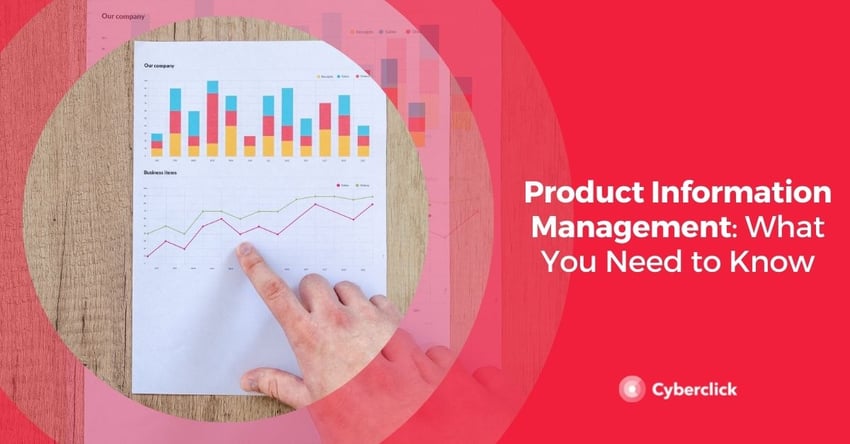As a supplier, distributor, or retailer, the success of your marketing plan relies, in part, on having the right tools and techniques to ensure access to high-quality and up-to-date product data across all your sales channels. A product information management (PIM) system is one such solution. It can help you harness the true power of your product information so that you make your mark in the ecommerce world.
Let's take a look at what PIM is, what data you can manage with the right solution, and how it can benefit your business. We will also outline some of the most popular product information management systems on the market to help you find the right solution for your company.

What Is Product Information Management?
Product information management (PIM) is a centralized platform used to collect, manage, and distribute all data required for marketing and selling products. This includes product specs, descriptions, images, and videos. The aim is to streamline processes and attract the attention of potential online buyers with consistent and quality product data and information.
Compared to alternatives such as Catalogue Management software, PIM collects data from multiple sources and formats and combines them into a single source of master data. This data can then be used to facilitate internal and multichannel distribution processes which include the following:
- Identifying and fixing problematic or inconsistent data
- Automating data and ecommerce business processes
- Collecting and unifying product information from various sources
- Creating and managing categories to organize products
- Offer online shoppers a working search bar or filtering function
- Having an effective search engine
- Promoting products through social media, marketing, or sales channels
What Data Does a PIM Have?
A good product information management system is able to deal with incoming, outgoing, and cross-department product content.
This includes:
- Basic product data (names, descriptions, etc.)
- Technical data
- Product Specifications
- Stock-keeping units (SKU)
- Identifier codes
- Categories
- Price
- Digital assets including pictures, video and logos
- Stock data
- Translations
- User reviews and testimonials
- Product resources (manuals, guides, etc.)
- Style sheets and designer notes
- Marketing and sales documents
- SEO data
How Product Information Management Can Benefit Your Business
There are a number of strategic, marketing, and financial benefits to implementing a PIM system in your business.
Let’s take a look at some of the biggest advantages.
Better Product Data Management
The more products you sell, the harder it becomes to keep track of all your data. A reliable PIM system can help you organize all your product data so that it is easier to access and share across all your channels. This improves productivity, reduces development errors, and ensures consistency.
Improved Customer Experience
Better product data management also results in an improved customer experience. This is because customers have consistent access to detailed and relevant data at all times. They also have access to real-time data including stock levels, which reduces shopping cart abandonment. Plus, customers are generally happier because they can perform their own detailed product comparisons, so they feel more in control of their purchases. This also means they spend less time contacting customer support with product and stock queries.
Increased Efficiency
A PIM system also has the added benefit of boosting efficiency. This is because data processes are automated, so your employees don’t waste time entering and re-entering data manually. It also makes it easier for inventory to be updated in advance and for shoppers to search for products through your website.
Cost-Savings
Finally, using the right product information management system reduces your operational and supply chain costs. It reduces management risks and prevents the costs of bad product data. You can replace out of stock items faster and use data to improve your delivery methods, further boosting the customer experience.
Product Information Management Tools
There are a number of PIM software solutions on the market that can be used to manage, automate, and streamline your processes so that you can offer consistent, accurate, and high-quality product information to your customers. The solution you choose will depend on the priorities of your business.
Most include a selection of the following features:
- Features for easily importing data from outside systems or sources
- Tools to enrich product data with marketing copy and digital assets
- Bulk editing capabilities
- Channel readiness
- Creating and managing categories
- Content analytics
Here are some of the most well-known PIM tools currently on the market.
Akeneo PIM
Akeneo is a global leader in Product Experience Management (PXM) solutions and they have designed an intuitive open-source PIM platform that radically simplifies product information management. The platform collects and centralizes product information from most sources, improves team collaboration and productivity around product information enrichment, and helps you deliver the most compelling multichannel product experiences.
Sales Layer PIM
Sales Layer is a user-friendly PIM platform that gives you access to product intelligence to improve your customer experience. The agile SaaS based platform has an intuitive user interface that can be used to centralise product data from ERP, CRM and CMS and host all your assets in one place.
Catsy
Catsy is a leading, reasonably priced PIM tool that makes it easy to send your product content to all of your sales channels. It offers a wide range of export options, including retail partners, online shopping carts, ERP systems, and CRMs, to help you optimize your product data and digital asset management processes. You can also grade content according to distributor and retailer spec requirements, ensuring complete and compelling product pages. Plus, you can publish products across all distributor, retailer and ecommerce store channels in a matter of clicks.
Salsify
Finally, perhaps one of the most well-known solutions is Salsify.
Salsify's CommerceXM platform powers the experiences shoppers demand at every stage of the customer journey. The platform has been purpose-built for the digital shelf and promotes itself as a one-stop shop to drive your products to market. It combines integrated PIM, DAM & Experience Builder, with commerce capabilities designed to enable sales across both retailer and distributor channels as well as marketplaces, social commerce, and direct-to-consumer (D2C) sites.
Top global brands including L'Oreal, Coca-Cola, and Mars use Salsify to help them stand out from the crowd.
Data Scientist en Cyberclick. PhD en Astrofísica por la Universitat de Barcelona con más de diez años de experiencia en investigación mediante el análisis e interpretación de datos. En 2019 redirige su carrera profesional hacia el mundo del Data Science cursando el Postgrado en Data Science y Big Data de la UB, así como participando en el programa Science To Data Science (S2DS) en Londres. Actualmente forma parte del equipo de Data Science y SEM de Cyberclick.
Data Scientist at Cyberclick. PhD in Astrophysics from the University of Barcelona with more than ten years of research experience through data analysis and interpretation. In 2019 he redirected his professional career to the world of Data Science by graduating in Data Science and Big Data from the UB, as well as participating in the Science To Data Science (S2DS) program in London. He is currently part of Cyberclick's Data Science and SEM team.






Leave your comment and join the conversation